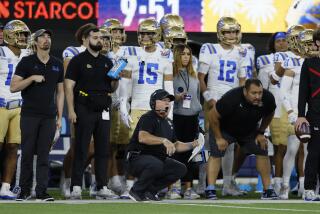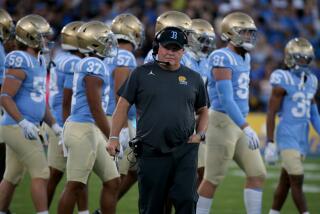A Full Life
- Share via
Kelly Leeper seemed no different from any other freshman trying out for the Newport Harbor High boys’ tennis team this year.
Kelly did the 2 1/2-mile run that Coach Rich Berman demanded. Kelly ran up and down the 20 stadium steps. Kelly did 20 wind sprints.
Kelly completed all these fitness tests without saying a word and if Kelly didn’t stand out, well, that’s what the coach was looking for. Standing out would be bad. Standing out would mean not finishing the fitness tests.
So when Berman got home later that day and heard the phone message from Stephanie Leeper, asking Berman to call Stephanie immediately, Berman was concerned. “Actually,” Berman says, “I was scared. Had I done something wrong?”
When he returned the call to Stephanie, Kelly’s mother, Berman received stunning news. “Stephanie told me that, basically, Kelly only has half a heart,” Berman said. “She thought I should know that.”
For on this day when Kelly, an engaging, inquisitive teenager, chose to try out for the junior varsity tennis team, he was declaring his independence. Kelly was saying, not with words but with intentions, that he was throwing himself more wholeheartedly than ever into living.
Into living with half a heart.
Three days after Kelly was born, Stephanie and Chas Leeper noticed that their son wasn’t crying, wasn’t eating, wasn’t being, in other words, a baby.
On the way to the hospital, Kelly stopped breathing. By the time Kelly reached the emergency room, their rosy-cheeked baby was turning blue. By the time Dr. Melvin Singer came to see the parents, Kelly had been given a death sentence.
Hypoplastic left heart syndrome was the diagnosis. Singer gently told the Leepers that Kelly had the same heart disease that, only six months earlier, had become famous. Baby Faye, who had received a baboon heart transplant in a desperate attempt to save her life, also had been born with hypoplastic left heart syndrome. The baboon heart, ultimately, didn’t save Baby Faye.
As the Leepers listened, the news got worse. Basically, the left half of Kelly’s heart was useless. It didn’t pump, it didn’t work. Kelly didn’t have the energy to cry or eat. “Basically,” Stephanie says, “Dr. Singer told us to take Kelly home and let him die.”
Stephanie Leeper is telling this story on a blustery, chilly afternoon at Newport Harbor High. Stephanie and Kelly are sitting on the bleachers next to the tennis courts.
Kelly offers to show off the scars on his chest after two heart surgeries, but Stephanie thinks that might not be wise because of the weather.
The half of Kelly’s heart that has to do all the work to keep this fidgety, intense 14-year-old (“I turn 15 May 21,” Kelly says) alive doesn’t keep everything working perfectly. Kelly can’t get warm easily in cool weather and can’t cool off efficiently when it’s hot.
One of Berman’s duties is to watch Kelly during practice to make sure his lips don’t turn blue. When Kelly’s lips turn blue, he needs to take a break. Rest. Breathe. Warm up.
“Kelly has more heart than most players I’ve had,” Berman says. “His commitment and work ethic are as good as anybody I’ve ever had.”
Kelly had never played tennis before he tried out for the Newport Harbor team. He hadn’t played many sports. His older sister, Faith, and older brother, Chas Jr., are accomplished athletes, college water polo players. Kelly saw the satisfaction and joy that competing brought his siblings. “I wanted that,” Kelly says. “I wanted that experience.”
Knowing he wouldn’t be as good as Faith and Chas are in water polo, and listening to a cousin talk about what a great sport tennis is, Kelly chose tennis when it was time to sign up for high school team tryouts.
The thing is, Kelly never told his parents he was trying out for tennis. Never told his doctors either.
Willing to Take the Risk
On that day in the hospital, after Singer left the Leepers in the waiting room, he went to find a medical magazine article he had recently read about a surgical procedure that was prolonging the lives of patients with hypoplastic left heart syndrome. Singer asked the Leepers if they were interested. The Leepers said yes.
Within hours, Chas and Kelly and a nurse were on a chartered jet to Boston Children’s Hospital. Stephanie followed later. Insurance red tape was cut even as the Leepers were being told, in essence, that their son was being used as an experiment. The surgery, called the Norwood procedure, hadn’t been done often. There was no information about survival chances or quality of life.
Dr. Richard Jonas, the Boston surgeon, told the Leepers he gave Kelly a 5% chance of surviving the surgery. Jonas, a professor of cardiology at Harvard as well as chief of cardiology at Boston Children’s, had only been performing this surgery for five months when the Leepers arrived.
In healthy hearts, the right side, the right ventricle, pumps blood into the lungs. The left ventricle pumps blood into the rest of the body. Since Kelly’s left side was non-functioning, his right ventricle had to be reconstructed to do all the pumping.
If Kelly survived this initial operation, Jonas could give the Leepers no survival statistics after that. There just weren’t any.
Kelly survived the surgery and even began to thrive. Within a month, the Leepers were back home. When Kelly was 2, another surgery was needed. Another trip to Boston. Jonas was again telling the Leepers that Kelly probably wouldn’t survive the surgery. This time, the Leepers were back home with an active toddler in three weeks.
Even now, Jonas says, the parents of children born with hypoplastic left heart syndrome are told to take their children home to die. “There are still cardiologists who are skeptical about this procedure,” Jonas said. About six or seven years ago, in fact, Jonas came to Anaheim to debate the surgeon who performed the baboon transplant with Baby Faye. Not a great debater, Jonas had an ace in the hole.
“At the end of my speech,” Jonas says, “I had Kelly and his family at the back of the auditorium. Kelly ran from the back to the stage, bounded up the steps and gave a little speech. I said, ‘This is the quality of life you can have with the Norwood procedure.’ I think I won the debate that day.’ ”
Jonas hasn’t seen Kelly since that day in Anaheim. When he was told that Kelly was playing high school tennis, Jonas said, “Oh my gosh. Really? Really? That’s so great.”
As recently as 10 years ago, nearly all of those babies born with Kelly’s condition died. At this point, Stephanie says, Kelly’s doctors can offer no long-term prognosis. “That’s correct,” Jonas says. “We just don’t know.” Every six months, Kelly is examined by Singer at Children’s Hospital of Orange County and the results are sent to Jonas in Boston. Every six months both doctors, Stephanie says, “just say wow.”
And the Leepers have come to an understanding with Kelly’s half a heart.
“We cannot treat Kelly differently,” Stephanie says. “What would be the point of Kelly living if all we ever did was tell him no? When we tried, he would get miserable, grumpy. So we finally decided Kelly needs to be a kid.”
Stephanie, who is a secretary for the Southland Christian Schools, and Chas, who is in real estate, are athletic. Faith and Chas Jr., are athletic. It was natural for Kelly to want to be in sports.
Kelly is matter-of-fact about his condition.
“I’ve adapted to it,” Kelly says. “I don’t think about it. I get tired easily. That’s just always been part of my life.”
Berman says he wishes he had 20 kids just like Kelly. When Berman and the high school were informed of Kelly’s condition and his desire to play tennis, there was some concern.
“We understood,” Stephanie said of the school officials’ unease. “We knew we had to absolve the high school of all liability and that wasn’t a problem. But Kelly just wanted this so much.”
It is, Stephanie says, the time of life when teenagers demand, and need, more control over their lives. “We can’t protect Kelly forever,” she says. “We can’t make all Kelly’s decisions for him. Would I have let him do this? I don’t know. But I know this is a decision Kelly has to make for himself. He is going to have to take care of his body.”
Kelly has progressed so far that he is now playing doubles for the junior varsity team and is 3-3. “He’s steadily improving,” Berman says. Kelly plans to take tennis lessons this summer, the first formal training he will have had in the sport.
And Stephanie sends her son off to school every day.
“I know that any day I could get a call from the school that Kelly is in the hospital. Or worse. But what would be the point of not letting him do anything?” she says. “Sports is so important to him. Being on this team was so important to him.
“And, really, isn’t every day we have him a miracle? We think it is.”
Diane Pucin can be reached at her e-mail address: diane.pucin@latimes.com
More to Read
Get our high school sports newsletter
Prep Rally is devoted to the SoCal high school sports experience, bringing you scores, stories and a behind-the-scenes look at what makes prep sports so popular.
You may occasionally receive promotional content from the Los Angeles Times.






